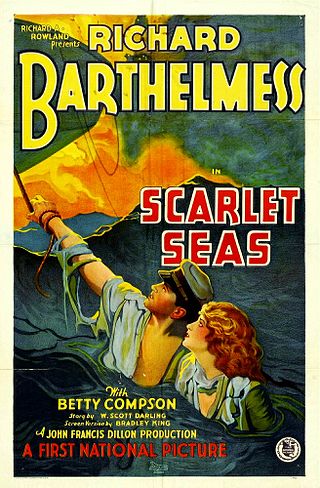Top Qs
Timeline
Chat
Perspective
Scarlet Seas
1928 film From Wikipedia, the free encyclopedia
Remove ads
Scarlet Seas is a surviving[1] 1929 American synchronized sound romantic adventure film produced by Richard A. Rowland and distributed by First National Pictures. Although there is no audible dialogue, the film was released with a musical score with sound effects using the Vitaphone sound-on-disc recording process. The picture was directed by John Francis Dillon. It starred Richard Barthelmess, Betty Compson, and a teen-aged Loretta Young. The film was formerly presumed lost.[2][3][4]
The story was written by W. Scott Darling.[5]
Remove ads
Plot
Summarize
Perspective
Steve Donkin (Richard Barthelmess) is introduced as a stoic and embittered seaman, operating aboard the Southern Cross, a two-masted schooner engaged in smuggling narcotics off the coast of Apia. In Apia, he visits a disreputable café and begins a flirtation with Rose (Betty Compson), the establishment’s chief entertainer. Their interaction provokes the jealousy of Toomey (Jack Curtis), a violent seaman with a claim on Rose. Toomey instigates a fight, and his gang removes Donkin by force.
Later, Captain Barbour (Knute Erickson) and his daughter Margaret (Loretta Young), a young and innocent girl, are seen walking along the quay. The Captain rebukes Toomey for drunken conduct, prompting Toomey to accuse Rose of robbery. Captain Barbour brings the matter to the island commissioner, who gives Rose 24 hours to leave the territory. Seeking a means of escape, Rose persuades a sailor aboard the Southern Cross to let her on board during the night, and then convinces Donkin to allow her passage to Shanghai. Though Donkin is initially resistant and emotionally impenetrable, he consents.
During the voyage across the Pacific, a violent typhoon destroys the Southern Cross, leaving only three survivors: Donkin, Rose, and Johnson (James Bradbury Sr.), a Swede. Adrift in an open boat, the trio face hunger, despair, and isolation. Rose turns to prayer; Johnson speaks of God, while Donkin bitterly denounces the idea of divine intervention. Driven mad by starvation, Johnson attempts to attack Donkin with a knife and is thrown overboard in self-defense.
In the aftermath, Donkin and Rose are drawn together by their shared suffering. Facing death, they experience a shift in their relationship, culminating in a declaration of love. Donkin—previously a skeptic—declares his belief in God. They are eventually rescued by a ship captained by Barbour, now under the control of a mutinous crew led by Toomey.
Upon boarding, Donkin is imprisoned in a cabin. Toomey threatens to have him thrown overboard in a canvas sack. In an effort to save Donkin, Rose uses flirtation to distract Toomey. Witnessing this, Donkin misunderstands her intentions and reverts to his earlier cynicism and mistrust.
On the second day aboard the vessel, Donkin encounters Margaret while attempting to escape from his confinement. Her kindness and purity stand in stark contrast to the harsh world he has known. Through her, Donkin comes to recognize the possibility of goodness and makes a decision to protect Margaret and Captain Barbour from the mutineers.
Rose, misinterpreting Donkin’s attention to Margaret as romantic affection, becomes jealous. Eventually, Donkin and Toomey engage in a final, violent confrontation. Toomey fires a gun at Donkin, but Rose intervenes and takes the bullet in her side, saving him. Donkin overpowers Toomey.
In the wake of this act, Donkin realizes he was wrong in his judgments—about Rose, about Margaret, and about God. The narrative concludes with Rose’s survival, Toomey’s defeat, and Donkin's personal transformation, bringing the story to a redemptive and hopeful ending.
Remove ads
Cast
- Richard Barthelmess as Steven Dunkin
- Betty Compson as Rose
- Loretta Young as Margaret Barbour
- James Bradbury Sr. as Johnson
- Jack Curtis as Toomey
- Knute Erickson as Captain Barbour
uncredited
- Shorty English as Sailor
Music
The film featured a theme song entitled "Blossoms (That Bloom In the Moonlight)" which was composed by Ben Black and James Dietrich.
Critical reception
A review in Harrison's Reports found that the film contains "offenses to logic", including the nimbleness of the hero and heroine as they climb a rope ladder despite having survived days of hunger and thirst and the way the hero easily overcomes "a giant", lifts him, and throws him overboard.[5]
Preservation status
The film was long thought to be lost. A print has been discovered in Italy at Cineteca Italiana.[6]
See also
References
External links
Wikiwand - on
Seamless Wikipedia browsing. On steroids.
Remove ads

